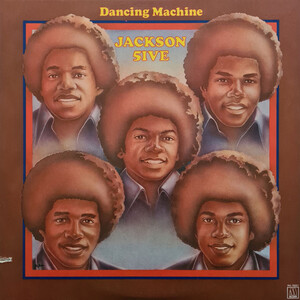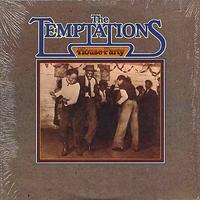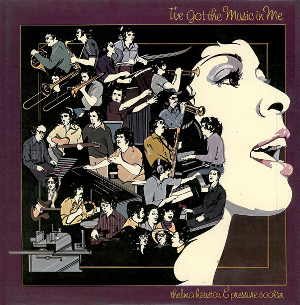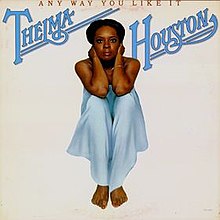
Dancing Machine is the ninth studio album released by the Motown quintet the Jackson 5, on September 5, 1974. The album's title track was a No. 2 pop hit and a No. 1 R&B hit in the United States. The group released two additional singles from the album: the funky "Whatever You Got, I Want" and the group's last US Top 20 hit for Motown, "I Am Love".

Moving Violation is the tenth studio album by the Jackson 5 and their final studio album on Motown Records, released on May 15, 1975. Aiming at the developing disco market, the group's funk-based version of Diana Ross & the Supremes' 1968 single "Forever Came Today" was a club hit, while the single's B-side, the R&B ballad "All I Do Is Think of You", became a popular and frequently covered song in its own right.

Diana & Marvin is a duets album by American soul musicians Diana Ross and Marvin Gaye, released October 26, 1973 on Motown. Recording sessions for the album took place between 1971 and 1973 at Motown Recording Studios in Hollywood, California. Gaye and Ross were widely recognized at the time as two of the top pop music performers.

Diana Ross & the Supremes Join the Temptations is a collaborative album combining Motown's two best selling groups, Diana Ross & the Supremes and the Temptations. Issued by Motown in late 1968 to coincide with the broadcast of the Supremes/Temptations TCB television special, the album was a success, reaching #2 on the Billboard 200. Diana Ross & the Supremes Join the Temptations spent four weeks at number one on the UK Albums Chart.

House Party is a 1975 album released by the American R&B vocal group, the Temptations, on Motown Records' Gordy label.

Marvin Earl Johnson was an American R&B singer, songwriter and pianist. He was influential in the development of the Motown style of music, primarily for the song "Come to Me," which was the first record issued by Tamla Records, the precursor to the famous label.

The Supremes is the twenty-seventh studio album by The Supremes, released in 1975 on Motown Records.

Ross is the ninth studio album by American singer Diana Ross, released in September 1978 by Motown Records. The album served as a new album and a compilation, as it was a mixture of old and new songs. Side A consisting of four new tracks recorded in 1978, and Side B of material recorded by Ross between 1971 and 1975, but remixed and/or extended by Motown in-house producer Russ Terrana specifically for the Ross album. Ross peaked at number 49 on the US Pop Albums chart, and number 32 on Black Albums. The album failed to chart in the UK. Its final US sales figures stood at around 150,000 copies. The cover illustration was by Rickey Ricardo Gaskins. A different album also titled Ross was released on the RCA label in 1983.

The Devil in Me is the sixth album by Thelma Houston released in 1977. While this album did not duplicate the commercial success of the Any Way You Like It album, it became a modest commercial success, peaking at No. 64 in the US album chart/No. 29 R&B. The lead single was the R&B and Club/Dance chart hit, "I'm Here Again". "I Can't Go On Living Without Your Love" was issued as a double-sided 12" single back-to-back with Diana Ross' "Your Love Is So Good to Me".

Two to One is Thelma Houston's seventh studio album released on Motown Records in June 1978. It was her second duets album with Jerry Butler, composed of only two left-over duets from their Thelma & Jerry album from the previous year, "If It Would Never End" and "You Gave Me Love", padded out with previously unreleased solo recordings by each singer, Houston's "Find a Way", "I'm Not Strong Enough " and "Don't Pity Me", while Butler's tracks included "We Owe It to Ourselves", "Never Gonna Get Enough" and "Chicago Send Her Home".

Thelma Houston (1972) is the second album by Thelma Houston, recorded in 1972 and released in 1973. The album includes the single, "Me and Bobby McGee". This is her first album recorded with Motown Records under the Mowest label. Two versions of the album were issued, a ten track version in the US and a fourteen track version in the UK and Germany. The album was reissued on CD in an expanded edition by Soulmusic Records in 2012.

Reachin' All Around is the twelfth album by Thelma Houston released in 1982. The album consists of previously unreleased material recorded while at Motown Records. While the album did not become a major seller, it is well liked by her fans. This album was released on CD in 2018 by Soulmusic Records, in a compilation that also includes The Devil in Me, Ready to Roll and Ride to the Rainbow.

I've Got the Music in Me is the third album by Thelma Houston featuring Pressure Cooker.
Hot was a vocal trio based in Los Angeles, California, whose membership was Gwen Owens, Cathy Carson, and Juanita Curiel. The group had a million-selling hit single in 1977 entitled "Angel in Your Arms".

"Angel in Your Arms" is a song composed by Herbert Clayton Ivey, Terrence Woodford, and Tom Brasfield, which was a 1977 Top Ten hit for Hot, and also a Top Ten country hit in 1985 for Barbara Mandrell.
Paul Riser is an American trombonist and Motown musical arranger who was responsible for co-writing and arranging dozens of top ten hit records. His legacy as one of the "Funk Brothers" is similar to that of most of the other "Brothers", as his career has been overlooked and overshadowed by the stars of Motown that became household names. Some of the Funk Brothers he worked with include: Earl Van Dyke, Johnny Griffith, Robert White, Eddie Willis, Joe Messina, Dennis Coffey, Wah Wah Watson, James Jamerson, Bob Babbitt, Eddie Watkins, Richard "Pistol" Allen, Uriel Jones, Andrew Smith, Jack Ashford, Valerie Simpson, Eddie "Bongo" Brown, Benny Benjamin, Cornelius Grant, Joe Hunter, Richard "Popcorn" Wylie, Marcus Belgrave, Teddy Buckner and Stevie Wonder.

Feelin' Bitchy is a 1977 album by singer-songwriter, Millie Jackson. It features two of Jackson's best known songs, the Merle Haggard cover "If You're Not Back in Love by Monday", and the Latimore track "All the Way Lover". The latter features one of Millie's trademark extended raps, this time on the topic of men who refuse to perform oral sex on their partners.

Upside Down: The Collection is a compilation album by Diana Ross, released by Spectrum Music/Universal in the United Kingdom in 2012. This album is a budget collection containing songs that were released from 1970 through 1981 on Motown Records. In the UK, 17 of the 20 songs contained in this compilation reached the Top 40. In the U.S., 12 of these songs made it onto the Billboard Top 40 singles charts, and 6 of those 12 reached number 1.
Arthur George Wright was an American R&B session guitarist, arranger, record producer and vocalist, sometimes credited as Art Wright.
Michael Lovesmith is an American R&B singer, songwriter, musician, record producer and executive. He has sometimes been credited as Michael L. Smith.
















